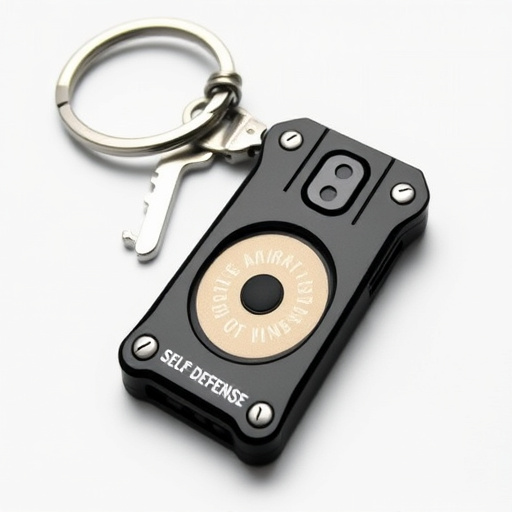University Approved Safety Keychains are essential for campus security, subject to varying legal requirements and university guidelines. To ensure quality and effectiveness, these keychains must meet stringent criteria regarding materials, construction (non-toxic and durable), and functionality like advanced locking mechanisms. Compliance involves researching regional regulations, proper testing and certification, detailed record-keeping, quality control during manufacturing, and regular procedure updates. Keychain features include compact design, tracking capabilities, and durable construction to prevent loss or theft of access cards, safeguarding sensitive campus information.
In today’s world, ensuring the safety of personal belongings is paramount. One often overlooked item? Keychains. This article guides you through the legal requirements for keychain safety devices, highlighting the importance of University-approved standards. We’ll walk you through a step-by-step compliance checklist to ensure your keychain meets these standards and offer insights into how safe keychains enhance our daily lives.
- Understanding Legal Requirements for Keychain Safety Devices
- University Approved Standards: What to Look For
- Ensuring Compliance: A Step-by-Step Guide
- Conclusion: The Role of Safe Keychains in Daily Life
Understanding Legal Requirements for Keychain Safety Devices
In ensuring the safety of personal belongings, keychain safety devices have gained significant attention, especially on university campuses where security is a top priority. The legal requirements for these devices vary across regions, but understanding these regulations is crucial for both manufacturers and consumers. Many universities have specific guidelines and approved standards for security items, including keychains, to ensure the safety of students and faculty.
Compliance with local laws and university policies is essential. Keychain safety devices, especially those marketed as University Approved Safety Keychains, must meet certain criteria regarding materials, construction, and functionality. These requirements are put in place to protect users from potential hazards and to prevent the sale of inferior or unsafe products. By adhering to these legal mandates, manufacturers can guarantee the quality and reliability of their keychain safety devices, giving consumers peace of mind.
University Approved Standards: What to Look For
When considering university approved safety keychains, it’s crucial to look for products that meet specific standards designed to ensure their effectiveness and quality. These standards are typically established by universities themselves or in collaboration with safety organizations, and they cover various aspects of keychain design and functionality. For instance, materials used should be non-toxic and durable, ensuring the keychain can withstand daily use while posing no health risks.
The keychains must also incorporate robust security features such as advanced locking mechanisms that prevent accidental disconnection. Look for keychains with additional safety measures like built-in alarm systems or GPS tracking capabilities to enhance their protective qualities. Certification from reputable testing agencies and university approvals serve as guarantees that the products meet these stringent standards, making them reliable choices for enhancing personal safety on campus.
Ensuring Compliance: A Step-by-Step Guide
Ensuring compliance with legal requirements for university-approved safety keychains is a multi-step process that requires meticulous attention to detail. Start by thoroughly researching and understanding the specific regulations governing the design, manufacturing, and distribution of safety keychains in your region. This includes familiarizing yourself with any industry standards or guidelines set by relevant bodies, such as those related to materials used, durability standards, and labeling requirements.
Next, verify that the safety keychain you’re offering meets these standards. Ensure proper testing has been conducted to certify its effectiveness and safety features. Keep detailed records of all certifications and test results. Implement a quality control system within your manufacturing process to guarantee each keychain produced adheres to the required safety protocols. Regularly update your procedures as new regulations or industry best practices emerge, ensuring your university-approved safety keychains remain compliant.
Conclusion: The Role of Safe Keychains in Daily Life
In today’s world, where security is a paramount concern, university-approved safety keychains have emerged as indispensable tools for everyday life. These innovative devices offer a simple yet effective solution to prevent accidental losses or thefts, providing peace of mind for students, faculty, and staff alike. Their compact design makes them easily portable, ensuring that vital access cards remain secure while on the move.
The integration of advanced safety features into keychains has revolutionized access control. With built-in tracking capabilities and durable construction, these keychains allow users to monitor their belongings’ location, preventing misplacements or thefts on campus. By adhering to university-set standards, these devices guarantee not only physical security but also the protection of sensitive information associated with campus access cards.
In conclusion, understanding and adhering to legal requirements for keychain safety devices is paramount for ensuring consumer protection. University-approved standards, like those set by relevant regulatory bodies, serve as a beacon guiding manufacturers in creating safe and reliable keychains. By following a step-by-step guide to ensure compliance, businesses can offer products that enhance daily life without compromising safety. Incorporating university-approved safety keychain standards into production processes not only meets legal mandates but also instills trust among consumers, knowing their keys are secure and protected.
